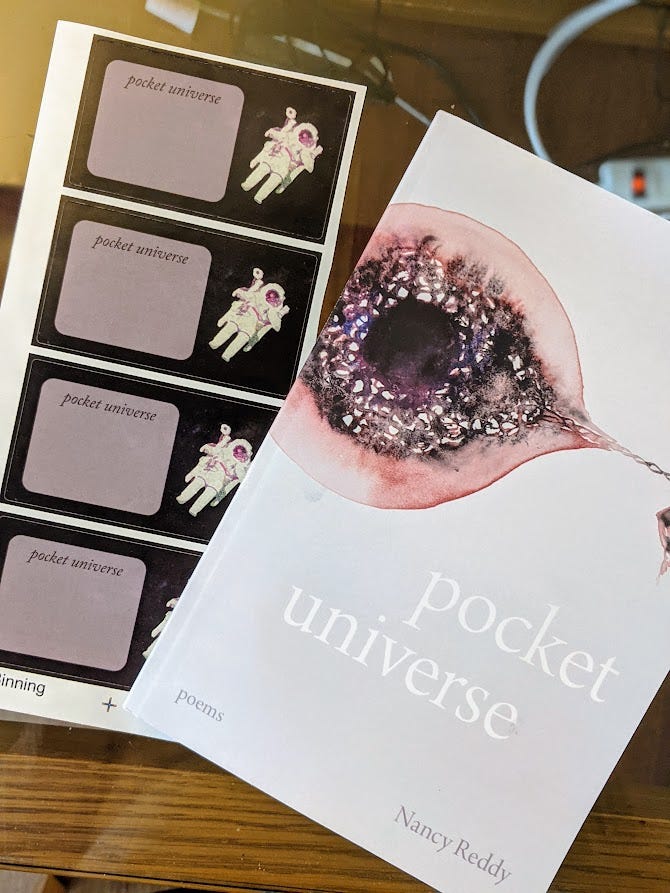show your work
workshop, writers groups, and asking for help
I finished graduate school with some odd and unhelpful ideas about workshop and writing groups. I’d spent years submitting work for classes, for conferences, for dissertation writing groups, for permission to write my dissertation and for approval to graduate. Because those processes are so focused on feedback and improvement, it felt like no matter what I did or how hard I worked on a piece of writing, I’d end up being told the various ways I’d fallen short.
By the end of it, I didn’t want to have one more person tell me what I could do to make my work better. So for a long time I just stopped sharing or asking for help.
There was a moment in Felicia Rose Chavez’s Anti Racist Writing Workshop that shifted something in my brain. In the book, she describes the letter she has students write before their work is discussed in workshop. Students use the letter to introduce their work to the group and to describe the kind of feedback they’d like. It’s a brilliant pedagogical move, one that creates the opportunity for writers to guide the conversation during workshop. It also makes writers responsible for their work in a way that conventional workshop pedagogy doesn’t—you can’t just shove your papers at your classmates and wait to see what they tell you. (Chavez is also, as the title articulates, talking about this practice in a deliberately anti-racist workshop. Beth Nguyen’s Unsilencing the Writing Workshop also argues for the benefits of workshops where the writer is allowed to speak and guide the conversation.)
For me, the thing that clicked was this: workshop doesn’t have to be about waiting for readers to tell you what you’re doing wrong and how to fix it. It doesn’t have to be about getting approval for your work. You could share because you’re stuck and want to talk through your work. You could share because you want to be reminded that writing is social and that you have ideas that interest other people. You could even share just because you’re excited about what you’re working on. (Someone I’m in a writing group with now said recently that she wanted to keep meeting because the encouragement was important to her. I loved that perspective, which felt so different from the attitude I’ve sometimes had of dragging my drafts before the firing squad.)
Below, a few thoughts about showing your work—I’m using “share” here to encompass everything from sending a draft to a writing group for a traditional workshop to posting about your process on social media.
when to share and why
you’re stuck
When writing, I often reach a point where I’m so far inside my drafts that I’ve totally lost sight of what I was trying to say. I’ve learned that this is a moment—not later, when I’ve figured it out, but right there in the ugly middle—when it really helps to talk about what I’m working on. Often a quick chat can get me unstuck. When I used to share drafts of scholarly writing with my friend Leigh, I’d often find myself writing a note to her in the comments that started with “what I’m trying to say here is . . .” and then I’d end up just moving that comment into the text because explaining it to her helped me figure out my problems. And if I don’t have an actual person to talk to, talking out loud to myself (a voice recorder helps here) can sometimes do the trick.
you’ve taken it as far as you can go
If you’ve worked on something and you know it’s not quite right but can’t figure out how to make it better, that’s a good time to ask for help. I think this works best if a) you have a reader you trust and b) you’re able to articulate what kind of help you want.
you want encouragement
You can share because you’re working hard and you want to be reminded that your work matters! This sharing might be a whole draft with formal feedback, or you could share snippets on social media or elsewhere. (I’ve been sharing pieces of drafts on instagram in my stories sometimes, and it’s been so helpful to be reminded that I’m not the only one who cares about my work.)
you’re celebrating
Celebrate your work—a full draft, a publication, even working out a tricky paragraph or stanza!
a few more wise perspectives on sharing your work
Laura van den Berg talked on twitter recently about when she shares drafts

and asking for different kinds of help at different stages

And Nicole Chung wrote about Knowing When to Share Your Work in her most recent newsletter at The Atlantic. I loved this part in particular:
Letting people I trust read and engage with my work at different stages is an essential part of the revision process. I won’t ask for edits or early reads the moment I finish a draft, nor when I feel it’s as good as it can possibly get, but when I believe I’ve taken it about as far as I can on my own. By then, I have been staring at it for so long that it’s difficult for me to see what’s missing. Others can help me identify not only the gaps, but the things it’s doing well. Sharing it with them also gives me a tiny preview of how it will feel to share it with the wider world—which is one reason why the manuscript I am now revising feels more like a book than it did before.
a few of my favorite things
I was reminded recently of this perfect spring poem, Ada Limón’s gorgeous Instructions on Not Giving Up, which begins
More than the fuchsia funnels breaking out
of the crabapple tree, more than the neighbor’s
almost obscene display of cherry limbs shoving
their cotton candy-colored blossoms to the slate
sky of Spring rains, it’s the greening of the trees
that really gets to me.
I haven’t read Melissa Febos’s Body Work: The Radical Power of Personal Narrative yet, though it’s at the top of my list. I loved her recent interview with Lilly Dancyger in the Los Angeles Review of Books, Catharsis Isn’t a Dirty Word.
One more plug for Claire Zulkey’s newsletter, Evil Witches—I loved this recent interview with Kelly O’Connor McNees, whose new book The Myth of Surrender is out now. McNees talked about writing and parenting and the mythology around early morning writing:
Getting up really early before everybody else is up has always been one of my ways of getting it done. But I hate when people say that, because then you picture someone that’s so disciplined. I go in spurts where I do that for two weeks and then I get really exhausted because I’m getting up too early and I’m not going to bed early enough. Then I have a meltdown, and then I sleep in for three days, and then I’m mad at myself. It’s never a smooth process, but I keep hacking away at it.
As an inconsistent early morning writer myself, I found that incredibly encouraging—like, you don’t have to do it perfectly, you can just do your best, and you can write a whole book that way. That’s true of just about everything with writing, in case you, too, are in a place where you need that reminder.
one book request
I’d like to ask a favor: if you’ve read Pocket Universe and/or The Long Devotion, could you post a review to Amazon? (Those links should take you right there!) You can review books on Amazon even if you didn’t buy them there. It’s my understanding that once a book gets 50 reviews, that changes how Amazon’s algorithm treats it, so your review can help make books visible to more potential readers. You don’t need to write anything long or deep—a sentence or two is great! just think about how you’d explain the book to a friend.
You can also find Pocket Universe and The Long Devotion on Goodreads where you can mark them as to-read or review them.
And I’d love to send you a Pocket Universe bookplate, if you like—just email me your receipt and your address. (We have Long Devotion thank yous coming soon, and I can’t wait to share!)
How are you sharing your work? What parts of your writing life do you want to celebrate? I’d love to hear from you. You can always reply to this email, comment below, or find me on twitter (@nancy_reddy) and instagram (@nancy.o.reddy).





This is so apt for me. I belong to a newly formed writer group and I have experienced some unappreciated types of feedback from some of the members. I asked myself if I'm being too sensitive. But after reading this, I will try again to ask for specific kinds of feedback before I read a new piece. This newsletter has given me the support I was looking for. I am encouraged to know that I have the right to decline certain types of critiques and to ask for what I need from the other members.
Thank you for this piece, Nancy!